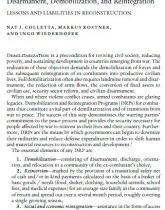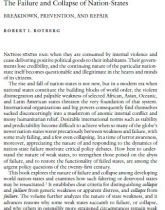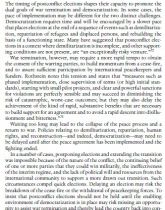Studijní materiál: R.I. Rotberg - When states fail. Causes and Consequences
Skrýt detaily | Oblíbený- Kvalita:84,6 %
- Typ:Studijní materiál
- Univerzita:Masarykova univerzita
- Fakulta:Fakulta sociálních studií
- Kategorie:Humanitní vědy
- Podkategorie:Politologie
- Studijní obor:Bezpečnostní a strategická studia
- Autor:clean.bandit
- Ročník:5. ročník
- Rozsah A4:348 strán
- Zobrazeno:1 202 x
- Stažené:0 x
- Velikost:2,0 MB
- Formát a přípona:PDF dokument (.pdf)
- Jazyk:český
- ID projektu:9564
- Poslední úprava:06.02.2017
THE HARVARD UNIVERSITY Failed States Project sought to learn how best to assess and to categorize the modern phenomenon of imploding nationstates. What were the distinguishing characteristics of state failure and state collapse in the post-Cold War world? Did state failure and collapse matter? If they did, how could state failure and collapse be prevented? How could the humpty dumpty of destroyed and fractured states, once disintegrated, be put back together?
Led by theWorld Peace Foundation and the WPF Program on Intrastate Conflict in the John F. Kennedy School of Government, Harvard University, the project enlisted the accomplished collaboration of more than forty gifted scholars and practitioners, nearly all of whom produced one or more (sometimes many more) versions of essays on the failed state problem or on examples of failed states. After a preliminary session at Wilton Park, in Great Britain, in 1999, the project convened three lengthy meetings at the Kennedy School from 2000 to 2001. The papers presented at those meetings, and the discussions about the topics and papers, eventually were transformed into the fourteen revised chapters in this book, and a complementary set of eleven revised country chapters in a companion volume: Robert I. Rotberg (ed.) State Failure and State Weakness in a Time of Terror (Washington, D.C., 2003).
The present volume includes an opening chapter that attempts to provide a classification and context for state failure. It is followed by two sets of chapters, the first on the nature and correlates of failure, the second on methods of preventing state failure and reconstructing those states that do fail.
Led by theWorld Peace Foundation and the WPF Program on Intrastate Conflict in the John F. Kennedy School of Government, Harvard University, the project enlisted the accomplished collaboration of more than forty gifted scholars and practitioners, nearly all of whom produced one or more (sometimes many more) versions of essays on the failed state problem or on examples of failed states. After a preliminary session at Wilton Park, in Great Britain, in 1999, the project convened three lengthy meetings at the Kennedy School from 2000 to 2001. The papers presented at those meetings, and the discussions about the topics and papers, eventually were transformed into the fourteen revised chapters in this book, and a complementary set of eleven revised country chapters in a companion volume: Robert I. Rotberg (ed.) State Failure and State Weakness in a Time of Terror (Washington, D.C., 2003).
The present volume includes an opening chapter that attempts to provide a classification and context for state failure. It is followed by two sets of chapters, the first on the nature and correlates of failure, the second on methods of preventing state failure and reconstructing those states that do fail.



